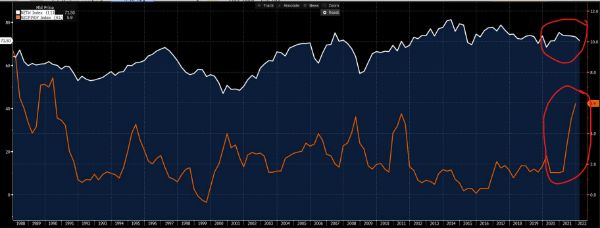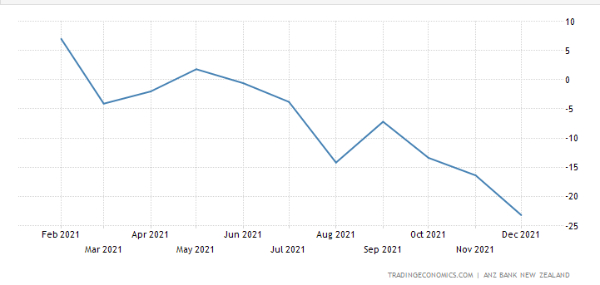New Zealand Dollar Faces Pressure As Inflation Rises
The Reserve Bank of New Zealand expects annual inflation to hit 4.4% by March 2022, a fresh 31-year high.
The latest survey shows the forecast to be well above the Reserve Bank’s target of between 1% and 3%. In the last quarter, NZ CPI soared to a 30-year high of 5.9% YoY. All of these figures point to a more aggressive tightening of monetary policy through the year at the seven meetings the RBNZ board will hold.
However, NZD stayed calm as inflation flared and the official cash rate increased in 2021. The dollar Trade Weighted Index (TWI) fell from 75 in January 2021 to 71 in February 2022, while inflation grew from 1.5% to 5.9% at the same time.

It indicates the devaluation of the dollar has been adding ongoing price pressure for imported goods, together with soaring freight costs resulting from the Covid-induced global supply chain disruption. Domestically, rising hiring costs, worker shortage, and surging home building costs also contribute to ongoing inflation pressure. The government’s decision to lift the minimum wage again certainly doesn’t help to solve the issue. It might leave the Reserve Bank only one option, which is to accelerate rate hikes and the reduction of its balance sheet.
The NZD has popped in February since the government announced plans to reopen the country’s borders to international visitors from October. However, it might only be short-lived. Overnight, the US also reported inflation at a 40-year high at 7.5% in January which pushed up the USD again due to a spike in US treasury yields. The commodity currencies including NZD, all suffered as the US dollar strengthened.
The ANZ Business Confidence index dived for the seventh straight month, to a one-year low in December 2021. With the omicron Covid variant spreading rapidly across the country and a longer waiting time for the border to reopen, the index could fall further in February.

It indicates the devaluation of the dollar has been adding ongoing price pressure for imported goods, together with soaring freight costs resulting from the Covid-induced global supply chain disruption. Domestically, rising hiring costs, worker shortage, and surging home building costs also contribute to ongoing inflation pressure. The government’s decision to lift the minimum wage again certainly doesn’t help to solve the issue. It might leave the Reserve Bank only one option, which is to accelerate rate hikes and the reduction of its balance sheet.
The NZD has popped in February since the government announced plans to reopen the country’s borders to international visitors from October. However, it might only be short-lived. Overnight, the US also reported inflation at a 40-year high at 7.5% in January which pushed up the USD again due to a spike in US treasury yields. The commodity currencies including NZD, all suffered as the US dollar strengthened.
The ANZ Business Confidence index dived for the seventh straight month, to a one-year low in December 2021. With the omicron Covid variant spreading rapidly across the country and a longer waiting time for the border to reopen, the index could fall further in February.
The next RBNZ policy meeting is scheduled for 23 February. A 25-basis point increase in the OCR might not be enough to lift the NZD as it is already widely expected. At the same time, the markets have priced in a 50-bps increase by the US Federal Reserve in March, which could press on the Kiwi dollar.
By Tina Teng, Markets Analyst, CMC Markets APAC & Canada


 NIWA: Students Representing New Zealand At The ‘Olympics Of Science Fairs’ Forging Pathway For International Recognition
NIWA: Students Representing New Zealand At The ‘Olympics Of Science Fairs’ Forging Pathway For International Recognition Coalition to End Big Dairy: Activists Protest NZ National Dairy Industry Awards Again
Coalition to End Big Dairy: Activists Protest NZ National Dairy Industry Awards Again Infoblox: Dancing With Scammers - The Telegram Tango Investigation
Infoblox: Dancing With Scammers - The Telegram Tango Investigation Consumer NZ: This Mother’s Day, Give The Gift Of Scam Protection And Digital Confidence
Consumer NZ: This Mother’s Day, Give The Gift Of Scam Protection And Digital Confidence NZ Airports Association: Airlines And Airports Back Visa Simplification
NZ Airports Association: Airlines And Airports Back Visa Simplification Netsafe: Statement From Netsafe About Proposed Social Media Ban
Netsafe: Statement From Netsafe About Proposed Social Media Ban